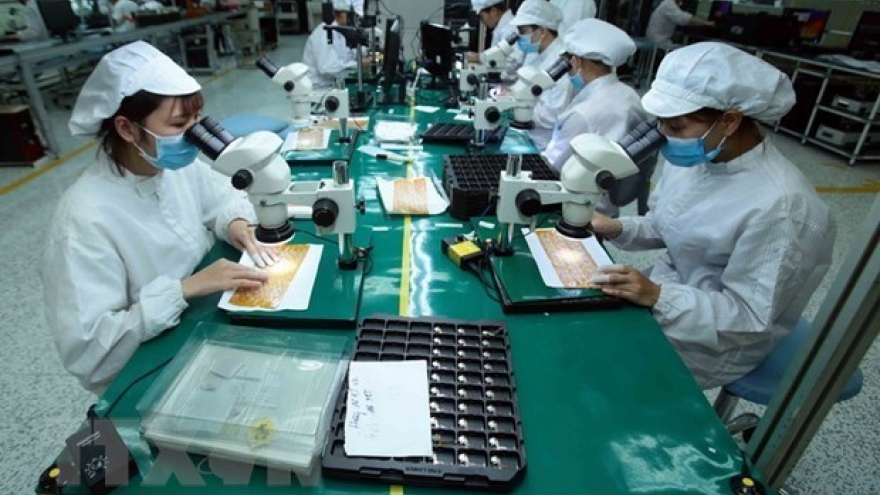Enhancing competitiveness vital for Vietnam to climb up global value chain
Enhancing national competitiveness and capacity of domestic enterprises is vital for Vietnam to climb up the global value chain in the new context of globalisation, heard a workshop held by the Vietnam Institute for Economic and Policy Research (VEPR) in Hanoi on December 5.
“The abundant foreign direct investment (FDI) capital has given Vietnam a new image on the global trade map but has not been able to pull the economy up a higher value ladder,” VEPR’s Vice President Nguyen Quoc Viet said at the workshop themed “Facilitating Vietnam’s integration into the global value chain through enhanced FDI linkages”.
Viet cited findings of VEPR’s report that the FDI sector still dominates Vietnam’s export and import while the added value that domestic firms contribute, especially in the processing and manufacturing industry, remains modest.
Vietnam’s exports mainly focus on labour-intensive industries with low added value. The country’s imports of inputs also have low added value and weak technology diffusion, the report found.
“There are certain emerging linkages in industry clusters towards the global value chain under the leadership of FDI enterprises. However, many industries are reaching critical points, which can be seen through the crisis of the garment and footwear exports, making it difficult for Vietnam to participate further in the global value chains unless breakthroughs in capacities are made,” Viet stressed.
Viet pointed out barriers which come from problems in the macro-level competitiveness, internal capacity of domestic enterprises as well as the lack of efficiency and consistency of policies.
Specially, domestic enterprises remain weak in the capacity to embrace innovation, promote research and development, technology application and financial capacity, he said, adding that the quality of human resources is also a problem, besides weakness in governance capacity.
“There are changes in investment appetite with the resettlement of rules when the global minimum tax policy is adopted,” he said.
The global minimum tax will affect the competitive advantage of Vietnam in attracting FDI in the short term of because of changes in the preferential tax framework.
“Countries, including Vietnam, will need to cease the race for the lowest taxation and tax-related incentives with other nations in the region,” Viet urged.
“The opportunity to increase the competitive advantage in attracting investment in general, and FDI in particular, lies in enhancing national competitive capabilities,” he stressed.
“Enhancing competitiveness becomes vital for Vietnam to integrate into the global value chain in the new globalisation context which raises new requirements including environmental, social and corporate governance (ESG), just energy transition and green development,” Viet said.
Emphasising the gap between policy and implementation, Viet said it is critical to carry out a comprehensive review of the legal system to attract investment.
“Vietnam will have to solve the puzzle of balancing national interests and investor interest, amend the Law on Corporate Income Tax and Law on Investment,” he said, adding that the focus would be on creating a transparent and predictable investment climate.
“Creating connections between regions is becoming a crucial measure to stimulate the development of industrial clusters, opening up new opportunities for the economic growth of Vietnam,” he said.
Think outside the box
Catching up with global transition trends and meeting new requirements become vital for Vietnam, raising the need for transforming the growth model to establish new competitive advantages for further integration into global value chains.
“Garment, footwear and wood industries are having difficulty as exports have been struggling. Electronics and assembly are predicted to be soon under pressure, in the very near future,” Viet said.
Preparations should be made, he said, stressing that this could not be done by a single enterprise alone but requires a comprehensive transition of the entire economy.
According to Nguyen Dinh Cung, former Director of the Central Institute for Economic Management (CIEM), never has Vietnam been in such a difficult situation as today during the past 40 years of reform and development.
The difficulties come from the dramatic decline of global demand with prolonged impacts on production and export coupled with the disruptions of property and bond markets while measures to overcome the difficulties remain vague, Cung said.
Support policies for enterprises should be extended, even to the end of 2025, he said.
“It’s time Vietnam look at our internal capacity to find a way out of the difficulty, not relying on external resources,” he stressed. “There should be a change in thinking and a long-term vision… Vietnam should build a competitive advantage on the country’s internal strength.”
Cung said that Vietnam should focus on developing industries which can make the country an essential part of the world.
Human resources, technology: driving force
Human resources coupled with science and technology are driving forces for Vietnam in the context that the country is striving to advance its standing in the global semiconductor supply chain, said Nguyen Dinh Duc, Chairman of the University of Engineering and Technology.
Vietnam has the advantages for the development of the semiconductor industry as the world’s largest chip manufacturers are eyeing investments here, especially after high-profile visit exchanges between the US and Vietnamese leaders.
Pointing out the advantages from a young labour force and the world’s second-largest rare earth reserves for chip making, Duc said that the Vietnamese Government should develop policies to realise these advantages.
The focus should be on education and training to build high-quality human resources for the semiconductor industry, in which the coordination between universities and enterprises should be enhanced.
“Technology and talents should be the core if Vietnam does not want to miss the opportunity to become a part of the multibillion-semiconductor industry,” he said.
Financial expert Pham Xuan Hoe said that it is necessary to develop policies to promote the development of domestic enterprises and enhance their competitiveness. Especially, the tax policies should be fair between domestic and FDI enterprises.


